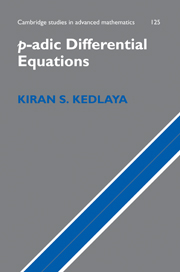Book contents
- Frontmatter
- Contents
- Preface
- 0 Introductory remarks
- Part I Tools of p-adic Analysis
- Part II Differential Algebra
- Part III p-adic Differential Equations on Discs and Annuli
- Part IV Difference Algebra and Frobenius Modules
- 14 Formalism of difference algebra
- 15 Frobenius modules
- 16 Frobenius modules over the Robba ring
- Part V Frobenius Structures
- Part VI Areas of Application
- References
- Notation
- Index
14 - Formalism of difference algebra
Published online by Cambridge University Press: 05 August 2012
- Frontmatter
- Contents
- Preface
- 0 Introductory remarks
- Part I Tools of p-adic Analysis
- Part II Differential Algebra
- Part III p-adic Differential Equations on Discs and Annuli
- Part IV Difference Algebra and Frobenius Modules
- 14 Formalism of difference algebra
- 15 Frobenius modules
- 16 Frobenius modules over the Robba ring
- Part V Frobenius Structures
- Part VI Areas of Application
- References
- Notation
- Index
Summary
We now step away from differential modules for a little while to study the related subject of difference algebra. This is the theory of algebraic structures enriched not with a derivation but with an endomorphism of rings. Our treatment of difference algebra will run largely in parallel with that for differential algebra but in a somewhat abridged fashion; our goal is to be able to use difference algebra to say nontrivial things about p-adic differential equations. We will begin to do that in Part V.
In this chapter we introduce the formalism of difference rings, fields, and modules and the associated notion of twisted polynomials. Then we study briefly the analogue of algebraic closure for a difference field. Finally, we make a detailed study of difference modules over a complete nonarchimedean field culminating in a classification of difference modules for the Frobenius automorphism of a complete unramified p-adic field with algebraically closed residue field (the Dieudonné–Manin classification).
Hypothesis 14.0.1. Throughout this part of the book and the next, we retain Notation 8.0.1 with p > 0 (so that K is a complete nonarchimedean field of characteristic 0 and residual characteristic p > 0) but, unless otherwise specified, we will require K to be discretely valued. This is necessary to avoid a number of technical complications, some of which we will point out as we go along. (We will make almost no reference to K in this particular chapter; we only include this hypothesis here in order to place it at the beginning of Part V.)
- Type
- Chapter
- Information
- p-adic Differential Equations , pp. 243 - 261Publisher: Cambridge University PressPrint publication year: 2010



